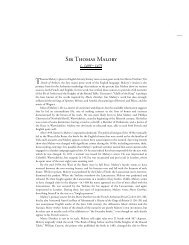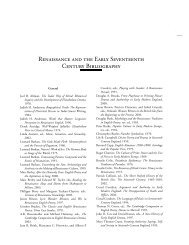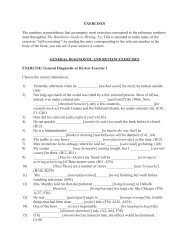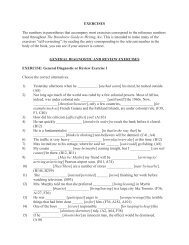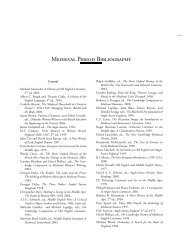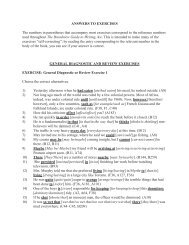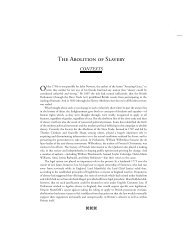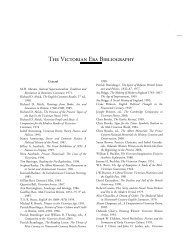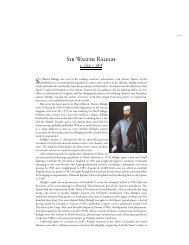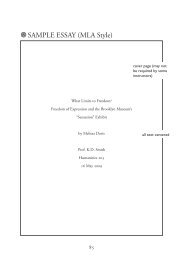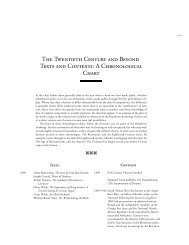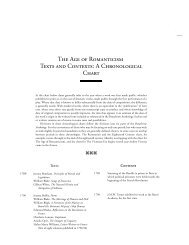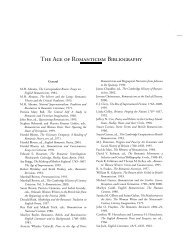Thomas Lodge - Broadview Press Publisher's Blog
Thomas Lodge - Broadview Press Publisher's Blog
Thomas Lodge - Broadview Press Publisher's Blog
You also want an ePaper? Increase the reach of your titles
YUMPU automatically turns print PDFs into web optimized ePapers that Google loves.
655<br />
660<br />
665<br />
670<br />
675<br />
680<br />
were murdered in their bosoms; many the tears of<br />
tender damsels, enforced in their flower of youth;<br />
many the poor, whose small possessions were ravished<br />
by the injuries of the mighty, whilst Robert,<br />
sitting aloft as the head of confusion, surfeiting in<br />
his excess, accompted riot 1 for righteousness, his<br />
drunkards for his divines, 2 his murderers for his<br />
mates, his blasphemers for his board companions.<br />
3 Oh, the horror and confusion of those<br />
times, where iniquity was held for equity, and devilishness<br />
accompted desert! In religious houses<br />
this devil of a man, and devilish man, instead of<br />
reverencing the learned, rid them of their lives; for<br />
at Ambois he entered a monastery of Minorites, 4<br />
and cutting off the fattest friars’ heads, he pitched<br />
them upon poles, causing the veriest knave to<br />
carry the cross, and the rest apparelled in copes to<br />
tune a devilish dirge of impiety. 5 From others he<br />
took away by violence their riches, saying, as Julian<br />
the Apostata 6 did after him, that riches did hinder<br />
them from the entrance into the kingdom of<br />
Heaven. Those of his train 7 who were most tyrannous<br />
he most highly rewarded, and such as did<br />
swear most might spend most. Great were the<br />
clamours of the poor, the cries of the oppressed,<br />
the complaints of the fatherless, the weepings of<br />
the widows, the father for his child, the child for<br />
his father, the mother for her son, the son for his<br />
mother.<br />
1 riot wanton, loose, or wasteful living.<br />
2 divines priests, chaplains.<br />
3 board companions the men with whom he would eat and drink.<br />
4 Minorites another name for the Franciscans (also known as Friars<br />
Minors or Grey Friars). Originally a mendicant order founded by<br />
Francis of Assisi in 1209, the Franciscans were released by Pope John<br />
XXII from the injunction against owning property (such as abbeys<br />
and monasteries) at the beginning of the fourteenth century.<br />
5 Robert organizes here a parodic religious procession; copes long<br />
cloaks or capes worn as an outer garment; here, the special attire of<br />
a friar or monk; given the nature of the parody, “cope” may refer to<br />
those particularly ornate ecclesiastical garments that would be worn<br />
on such special occasions.<br />
6 Julian the Apostata Flavius Claudius Julianus (332-63 CE), Roman<br />
emperor (360-63 CE), surnamed the “Apostate” because he<br />
renounced his Christian faith in favour of embracing and promoting<br />
a renewed paganism.<br />
7 train band of retainers or followers; retinue.<br />
T HOMAS L ODGE<br />
685<br />
690<br />
695<br />
17<br />
Nec quicquam nisi vulnus erat, cruor undique manat. 8<br />
In an abbey near to Lisseux he entered and slew<br />
all the monks, in that they would not show their<br />
treasures, and finding four pilgrims kneeling at a<br />
cross he cut off their heads, saying they could never<br />
die in better minds. Meeting with the bishop of Caen<br />
richly mounted upon a moil, 9 attired in his richest<br />
furniture, he dismounted him, saying he reserved<br />
that beast to a better use than that a beast should<br />
bestride it. Such and so many were his unworthy<br />
attempts, without all expectation of amendment.<br />
[Aubert, hearing news of Robert’s increasingly<br />
serious crimes, sends ambassadors to Turingue to<br />
call him home. Robert’s answer indicates his intent<br />
to usurp Aubert’s crown. With wounded citizens<br />
arriving daily at his palace and the threat of imminent<br />
civil war, Aubert condemns his son to death,<br />
announcing that anyone who brings him Robert’s<br />
head will be both pardoned and rewarded. With a<br />
loyalty approved of by the narrator, however,<br />
Aubert’s people refuse to do so. Robert continues<br />
murdering and pillaging with his violent followers<br />
until he makes the mistake of cruelly murdering<br />
the son of the Duke of Constances, sending the<br />
mangled head of the son to the father.]<br />
The Bloody and Cruel Battle Fought<br />
between the Duke of Constances and Robert<br />
the Devil and His Train, and What thereupon<br />
Ensued. [Chapter 7].<br />
It was now about eventide, and the Prince’s<br />
soldiers were either all of them sore wasted 10 or<br />
wounded when the Duke by main strength dis-<br />
8 Ovid, Metamorphoses, 6.388. Clamanti cutis est summos direpta per<br />
artus, nec quicquam nisi vulnus erat: cruor undique manat: “As he<br />
screams his skin is stripped off the surface of his body, and he is all<br />
one wound: blood flows down on every side.” This is the punishment<br />
inflicted by Apollo on the satyr Marsyas. Marsyas had proudly challenged<br />
Apollo, the god of music, to a contest on the pipes; Marsyas<br />
lost and was subsequently punished by the god for his presumption.<br />
9 moil mule.<br />
10 sore wasted greatly or terribly, exhausted or spent.



